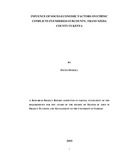| dc.description.abstract | This study sought to examine the influence of socio-economic factors on ethnic
conflicts in Endebess Sub-county, Trans Nzoia County in Kenya. The research
specifically sought to establish the influence of socio-cultural, political, economic
and security related factors influencing ethnic conflicts. The study findings are
significant to conflict management practitioners, scholars, policy analysts and to
the communities living in the sub-county. The study provides in depth
information upon which the conflict management practitioners can draw lessons
for use in their design of projects for intervention while scholars can gain from the
theoretical arguments and suggestions for new lines of research. The policy
analysts can enrich their justification for policy reviews and development. The
study applied the Cross – Cultural Research design. Methods for data collection
and analysis included Focus Group Discussions (FGDs), Questionnaires,
interviews and observation. A sample size of 384 was targeted but a response rate
of 397 was achieved. Several sampling techniques were used including stratified,
multistage, and simple random sampling. Non probability sampling methods like
purposive and snowball were widely used. Secondary data was obtained from
both published and unpublished literature. Both qualitative and quantitative
research approaches were used. The theoretical framework was built on the tenets
of Symbolic Politics Theory to analyze the occurrence of ethnic conflicts. Data
was analyzed using descriptive statistics that included mean, and mode and
Inferential statistics like Chi Square tests. In conclusion, the study found that
economic factors comprising historical land injustices (49.4%), inequitable
distribution of economic resources and opportunities (44.8%), land resettlement
problems (66.9%), competition over resource use (45.6%) and insecure land
ownership (67.3%) influenced ethnic conflicts in the area. Socio – cultural factors
that included symbols and artifacts (12.9%) like trees and caves, intolerance in
beliefs (15.1%), ethnic/clan rivalry (57.9%), high illiteracy level (60.4%) and
moranism and/or heroism (16.9%) contributed to the occurrence of ethnic
conflicts. Politics played a fundamental role through militia groups (14.9%) such
as Jubilee boys in the area, funding ethnic clashes (76.6%) and ethnic alignment
to political parties (39%) in the area. Security related factors that included
proliferation of small arms (33%), violent crimes (48.8%), threats against
members of certain communities (43.6%) and inefficiency of the security
agencies sustained and enhanced ethnic conflicts in the study area. The study
recommends equitable distribution of economic resources and opportunities to the
landless poor as well as redressing colonial wrongs and re-establishing justice in
the land sector. The council of elders from every ethnic community in the subcounty
should be re-energized as they are very essential and paramount in
resolving conflicts before they escalate. County Cohesion structures should be
established, strengthened and supported by the county government to promote
peaceful coexistence in the area. Establish effective Conflict Early Warning and
Early Response Mechanisms. Civil disarmament should be encouraged. | en_US |

